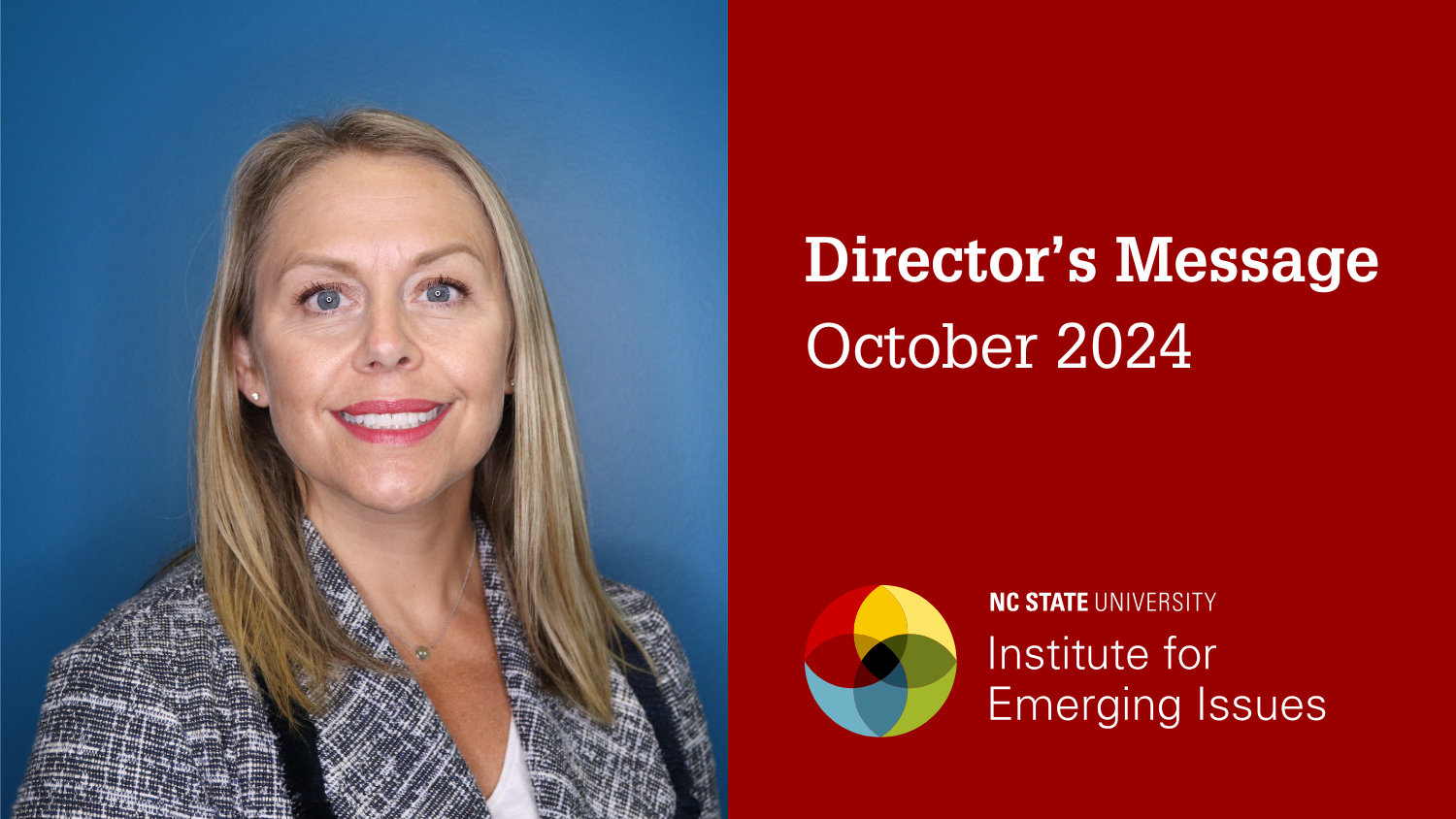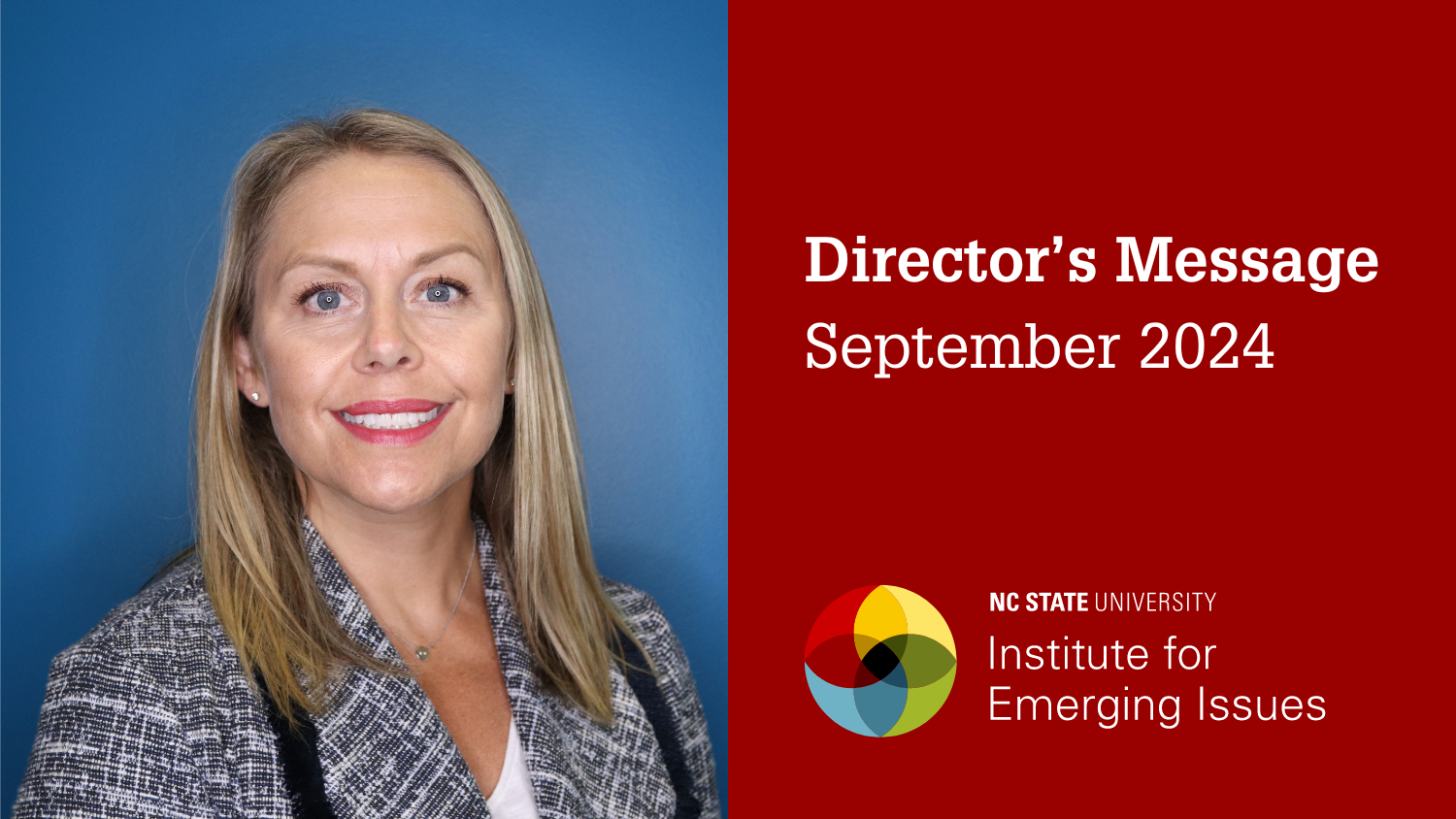Director’s Log | February 2024

On behalf of the Institute for Emerging Issues, I want to thank everyone who made the 2024 Emerging Issues Forum an outstanding event! From the insights and expertise of our speakers to the generous support of our sponsors, we appreciate everyone who contributed to the forum. I also want to thank our volunteers who gave their time to help with registration and other tasks throughout the day, and of course, the entire team at IEI who put in days, weeks and months behind the scenes to ensure that the forum went off without a hitch. Great job!
The Emerging Issues Forum is different from regular conferences in that participants contribute just as much to the conversation as those on the stage. The tools shared, curated by both speakers and participants, can be brought back to communities to help spark real change. It also brings together people and organizations who otherwise may never connect. Throughout the years, we’ve heard stories of successful partnerships and initiatives that have started with a simple conversation at an Emerging Issues Forum. I hope you walked away with new tools, ideas and connections to help support financial resilience in your households and communities. If you weren’t able to attend – or perhaps you would just like to relive the day – please check out this forum recap on our website. You can also find a plethora of resources referenced throughout the day on our website.
Personally, I learned a lot about how our day-to-day behaviors can impact our financial resilience in the long term, as well as some concerning trends that weren’t at all on my radar until now:
1) According to a 2021 biennial survey conducted by FDIC, 3.3% of NC households (approximately 147,576) are unbanked, meaning that no one in the household has a checking or savings account at a bank or credit union. This can lead to higher fees for financial services and make it difficult to establish the credit needed to qualify for loans and other big purchases. Programs like BankOn NC can be a powerful tool for anyone working to increase financial resilience in their communities.
2) While Buy Now, Pay Later (BNPL) services may seem like an attractive way to finance large (and small) purchases, users should proceed with caution. I learned that BNPL works by allowing a user to pay in four monthly installments; however, the more you use this tool, the more payment due dates you may have, which can quickly be difficult to manage. Data reveals that more than half of surveyed Gen Z and Millennial consumers missed at least one BNPL payment in the past year. And that is when late fees start to bite. Additionally, if you have to return an item, refunds will first be credited from merchants to the BNPL service. You may need to continue making payments until that credit is applied to your account.
3) Many of us enjoy the ease of using digital payment apps to split dinner bills among friends, chip in for birthday gifts or buy or sell second-hand goods from neighbors and friends. However, when funds sit in a digital payment app (before initiating a bank transfer), they may not be protected by the Federal Deposit Insurance Corporation (FDIC) or National Credit Union Association. This can be risky and is something to think about – especially when sharing a large payment.
IEI’s work on household financial resilience isn’t over. We’re currently accepting applications for our new two-year Financial Resilience Community Cohort until March 29. If you are part of an organization that works to increase household financial resilience, especially for communities facing barriers to saving and debt management, I encourage you to apply!
We’re also still accepting feedback on the Draft Roadmap to Financial Resilience. If you weren’t able to weigh in or even if you weren’t able to attend, you can review the roadmap and submit feedback by Friday, March 8. After reviewing your comments and the results from a survey of lower income North Carolinians, the Advisory Council will finalize this document and we will distribute it to those individuals and organizations that you tell us should see it.
This forum was the last in our three-part series supporting North Carolina’s economic resilience. If you’re curious to learn how this forum ties into the 2022 forum on educational attainment and the 2023 forum on connecting underrepresented workers to the workforce, I encourage you to listen to the latest episode of The Connector Podcast featuring myself and IEI National Advisory Board Member and former chair, Jack Cecil. A special thank you to IEI Communications Intern and NC State University senior, Adam Sichel, for hosting us!
Our team is hard at work planning the 2025 Emerging Issues Forum on energy, as well as the larger 2025-2027 series on North Carolina’s future-forward infrastructure. We look forward to announcing more information in the coming months. Until then, we have several other events in the coming months with our BAND-NC and Faith and Community Initiatives. We are also co hosting a special event with NC State University’s School of Public and International Affairs on March 28 where we’ll hear directly from young adults in all levels of government about the bipartisan work taking place to effectively serve communities and constituents. Stay tuned for more information, and we’ll see you in the coming months!
- Categories:


